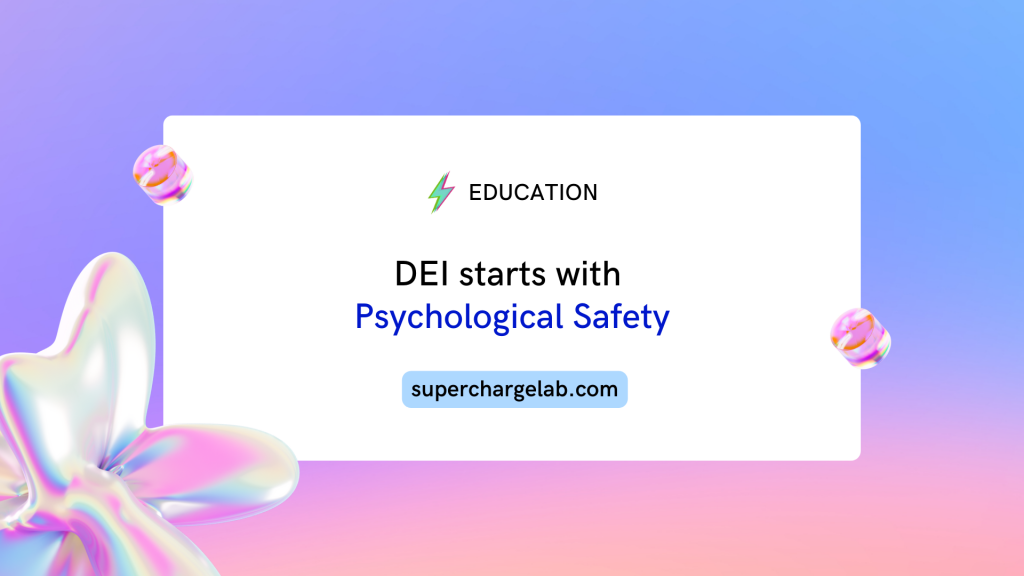
Two years ago, I wrote about why psychological safety was important to me and in every organization that I have worked in. And in an update to my views on psychological safety, the world has changed dramatically. The world has been grappling with issues of social justice and racial equality, which have highlighted the need for safe and inclusive workplaces. It is more important than ever to create an environment where individuals from all backgrounds feel valued and supported, and where they can bring their whole selves to work without fear of discrimination or marginalization.
Everyone is talking about it, but DEI professionals are struggling to be heard
Despite the growing awareness of issues related to diversity, equity, and inclusion (DEI), many DEI professionals are still struggling to make their voices heard. While there has been a surge of interest in this area in recent years, the reality is that many organizations still struggle to prioritize DEI in a meaningful way. This can make it difficult for DEI professionals to advocate for change and push for the kind of systemic improvements that are needed to create truly inclusive workplaces. Even as conversations around DEI continue to gain traction, it is clear that there is still much work to be done to ensure that these issues are given the attention and resources they deserve.
Every company is starting to develop or has developed some form of a DEI policy, but true action is lacking
In recent years, there has been a growing recognition of the need to address issues related to diversity, equity, and inclusion in the workplace. As a result, many companies have started to develop DEI policies and initiatives aimed at creating more equitable and inclusive work environments. However, it is often the case that these policies fall short of addressing the underlying issues at play. In many cases, the focus is on surface-level changes or quick fixes that do little to address the deeper structural and cultural factors that perpetuate discrimination and marginalization. To truly make progress in this area, companies must be willing to engage in meaningful, sustained action that prioritizes the well-being of all employees and aims to create a more just and equitable society.
There are millions of neurodivergent persons, persons with disability, and marginalized communities who struggle to breakthrough the glass ceiling and find meaningful work
For millions of people with disabilities, neurodivergent individuals, and members of marginalized communities, the struggle to find meaningful work and break through the glass ceiling can be an everyday reality. Despite progress in some areas, many workplaces are still rife with barriers that prevent these individuals from fully participating in the workforce and realizing their potential. Whether it’s due to systemic discrimination, lack of access to accommodations and resources, or simply a lack of understanding and empathy on the part of employers, the fact remains that far too many people are being left behind. Addressing these issues requires a concerted effort on the part of employers and policymakers to create more inclusive and accessible workplaces that prioritize the well-being and potential of all employees, regardless of their backgrounds or abilities.
How organizations can start with defining psychological safety
Defining psychological safety within an organization involves creating an environment in which employees feel comfortable sharing their thoughts and feelings without fear of judgment or retaliation. This is particularly important when it comes to discussing struggles and areas where employees may feel uncomfortable, as this is often where people are most vulnerable.
To start promoting psychological safety, organizations can take a number of steps. First and foremost, it is essential to create a culture in which honesty and openness are valued. This can involve everything from regular team meetings and brainstorming sessions, to more informal gatherings like company social events, where employees have the opportunity to interact and build relationships outside of the workplace.
Organizations can make it clear that seeking help and support when needed is not only acceptable but encouraged. This might involve providing resources like counselling services or employee assistance programs, as well as training managers and team leaders to be more attuned to the needs of their employees and better equipped to provide support when needed.
Creating an environment in which people feel safe to share their struggles and seek help when they need it also involves actively addressing issues that may be hindering psychological safety. This might include addressing behaviors like bullying or harassment, as well as working to dismantle systemic barriers that may be preventing certain groups of employees from feeling valued or heard.
The Solutions
- Hiring a DEI consultant/ professional is not your solution – true change must come from the top, and corporate communities must start to embrace changes in their workplace. It’s also good for business – (find the statistic that says that diversity has caused better profitability). DEI professionals need more autonomy in their recommendations as well, to be able to execute their plans with safety.
- Investments into DEI always pay for themselves, in greater presence, productivity and profitability within the organization.
- Understand that the way we work must be more empathetic, embracing of people who are different from us. This can come as a shock to corporate culture, as you take baby steps to incorporate different working styles into the workplace.
The elephant in the room
The current tech winter and crisis in the financial sector means that there are many able-bodied rockstars out in the market looking for a job. However, it’s a question of whether you’d want to treat the cancer or stick a bandage over the wound. The short-term gains of incorporating DEI are slow coming, but will develop in the future towards long term benefits all round.